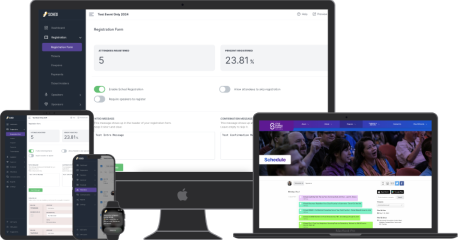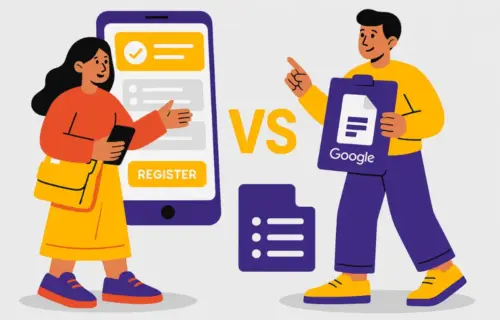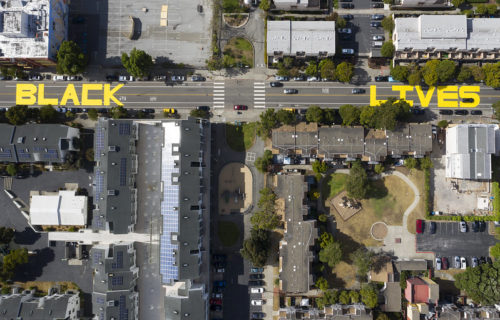Planning an education-related event? That might be a conference, a workshop, or something else altogether. Whatever the case, it’s important to have the right people in the right positions. Two of the most critical roles to fill are the event planner and event coordinator spots.
Not sure what to know about an event coordinator vs. event planner? Think that they do the same jobs? While both professionals have a hand in creating and delivering successful events, they’re not the same.
In this guide, we’ll compare the role of an event coordinator vs. event planner and highlight key differences between event planning and coordination so that you can create and delver amazing events.
TL;DR
Table of contents
- 1 TL;DR
- 2 What Is an Event Coordinator?
- 3 What Is an Event Planner?
- 4 Event Coordinator vs. Event Planner: Key Differences
- 5 Event Planning and Coordination: A Syllabus for Success
- 6 Event Planner vs. Event Coordinator vs. Event Manager vs. Event Designer: The Full Comparison
- 7 The Difference Between an Event Planner and Event Coordinator: Key Takeaways
- 8 FAQs
- 8.1 Can one person be an event planner and coordinator?
- 8.2 What are the most important skills to have for both event planners and coordinators?
- 8.3 How to decide if you need an event planner or an event coordinator?
- 8.4 What is another name for an event coordinator?
- 8.5 What is the difference between a wedding planner and wedding coordinator?
- 8.6 Do you have to be an event coordinator before becoming an event planner?
- Event coordinators handle logistics and execution. They’re the ones who handle tasks on the ground and keep events running.
- Event planners design captivating experiences, collaborating with stakeholders to deliver positive experiences through in-depth planning and big-picture thinking.
- Event planning and coordination are closely related but different. In most cases, you’ll need an event planner and a coordinator, but large events may benefit from having multiple coordinators working with the planner.
What Is an Event Coordinator?
In our discussion of planning vs. coordinating, we’ll begin with a close look at event coordination. What’s an event coordinator?
Imagine an event coordinator as the coordinator of an educational event. They meticulously plan the details, manage budgets, and coordinate schedules. They work to execute the event planner’s vision.
From booking venues for fundraisers to ensuring smooth transitions during ceremonies, event coordinators work to handle all the minutia. When the projector malfunctions during a guest speaker’s presentation, the event coordinator saves the day.
Here are some specific tasks that an event coordinator might handle with an education industry event:
- Execute the event vision
- Schedule and oversee vendors/guests
- Event setup and takedown
- Manage the event’s schedule to keep things on track
- Handling day-of requests
What Is an Event Planner?
Let’s take the next step in our discussion of event planner vs. event manager. Event planners are the designers of the event world. They work closely with the event organizer, discussing themes, objectives, and budgets to plan workshops, continuing education seminars, and academic conferences.
Based on their experience and expertise, they recommend guest speakers, event activities, and the right venues. When it comes to event planner vs. coordinator, you can think of planners as thinkers who turn an event vision into a tangible experience.
Some of the tasks an event planner might handle include the following:
- Meeting with event organizers to discuss general ideas
- Creating an overall plan to turn the event vision into a reality
- Suggesting dates and helping to set budgets
- Maintain communication with organizers to approve event details
- Identify vendors
- Identify event venues/locations
As you can see, there are plenty of differences in planning vs. coordinating. However, truly understanding how separate but intertwined these roles are requires a deeper dive into the responsibilities, roles, skills, and other differentiators that set apart an event coordinator vs. event manager or planner.
Event Coordinator vs. Event Planner: Key Differences
In any discussion of event planner vs. event designer, it’s important to highlight key differentiators. Below, we’ll discuss the responsibilities, education, training, skills required, and certifications that set an event planner and coordinator apart but allow them to work seamlessly together to create incredible education industry events.
Note that many of these are shared – event planners and coordinators must have many of the same skills and capabilities. It’s often more about experience and expertise, with the more experienced individuals taking on the planning role, while those with less field experience hand coordination-related activities.
Responsibilities
Let’s begin our discussion of the difference between an event coordinator and an event planner with a look at their responsibilities. Then we’ll broaden the discussion to help you understand how education, training, and certification support these professionals in those responsibilities.
Event coordinators: They handle logistics, from setting up classrooms to managing guest lists. Their focus is on execution.
- Vendor coordination: While the event planner identifies vendors, it’s the event coordinator’s responsibility to work with vendors, ensuring that each has what they need to get set up and have a successful event.
- Event setup: The event coordinator is tasked with handling all the details surrounding event setup. While these responsibilities will vary depending on the event’s scope, they can include setting up booths, tables, and chairs, installing signage and décor, and more.
- Guest management: When it comes to guests, the event coordinator is responsible for greeting and seating them, as well as checking that their requirements are met at all times.
- Problem-solving: Unexpected things happen, and education industry events are no exception. The event coordinator must be agile enough to handle whatever might come their way. This is one reason that larger events usually have multiple coordinators – often one per team.
- Event breakdown: When the event wraps up, it’s the event coordinator’s responsibility to handle event breakdown and cleanup.
Event planners: In the world of event planner vs. event designer, they design the educational experience and collaborate with the stakeholders involved. They’re the ones who say, “Let’s have a breakout session on innovative teaching methods!”
- Developing the vision: Both coordinators and planners have a hand in the vision. Event designer vs. event planner is more about execution. Planners, on the other hand, develop the vision for the event and then hand it off to the coordinator to bring it to life.
- Setting the budget: The event planner is responsible for understanding the event’s goals and challenges, and then creating a budget that will help reach those objectives.
- Selecting the venue: Event planners will compare different venues and choose the one that fits within the event’s budget while also meeting as many other needs as possible.
- Selecting vendors: While event coordinators handle vendor relations, event planners are tasked with selecting which vendors will be present at the event in the first place.
- Marketing and promo: Event planners are responsible for all the marketing and promotion leading up to the event.
Education
Event coordinators: Event coordinators should have a high school diploma or GED, but an associate or bachelor’s degree in a related field can help them deliver better events. That said, this is an entry-level position, and many coordinators have no higher education at all. They use this position as a springboard to move further into the industry.
Event planners: Like coordinators, event planners aren’t required to have more than a high school diploma or a GED, but higher education can help them plan more immersive, successful events.
Training
Event coordinators: Event coordinators usually require little in the way of previous training or experience, as this is an entry-level position. However, event coordinators must have strong skills that relate to the responsibilities they’ll have.
Event planners: When it comes to event planner vs. event manager training, planners require significantly more. Usually, they’ll need three years of training and previous experience. Note that experience as an event coordinator can lead to a position as an event planner.
Certification
Neither event coordinators nor event planners require official certifications. However, professional credentials can serve as a guarantee that they have a specific level of competency.
Certified Special Events Professional certification through the International Live Events Association is the gold standard for the industry.
Skills Needed
While a discussion of event consultant vs. event planner highlights the differences between these roles, they’ll need similar skills to be successful. Some of the most important skills to develop include the following:
- Communication skills
- Problem-solving abilities
- Customer service skills
- Time management skills
- Team-based mentality and teamwork skills
- Leadership skills
Event Planning and Coordination: A Syllabus for Success
When event planning aligns with event coordination, educational magic happens. The planner’s creative lesson plans meet the coordinator’s organizational skills, resulting in memorable moments for participants.
Alignment
Event Coordinators and Planners: Like a dynamic teaching duo, they work hand-in-hand to create impactful events. Coordination without planning? Incomplete. Planning without execution? A missed opportunity.
On the Big Day
Event coordinators: They’re on-site, ensuring everything runs smoothly. Think of them as the hall monitors of events.
Event planners: They’re there too, but they’re more likely to orchestrate from the back, making sure the event vision comes to life.
Event Planner vs. Event Coordinator vs. Event Manager vs. Event Designer: The Full Comparison
For a comprehensive breakdown, let’s explore the roles of event managers and event designers, in addition to our discussion of event coordinator vs. event planner. Each brings unique skills to the table, shaping the event landscape in specific ways.
| Role | Responsibilities |
| Event Planner | – Organizing corporate or private events, such as meetings, weddings, and conventions. – Meeting with clients to discuss their needs. – Maintaining partnerships with vendors and caterers. – Overseeing event setup, execution, and cleanup. |
| Event Coordinator | – Directly coordinating all event logistics. – Selecting and managing vendor relationships. – Booking suitable venues. – Coordinating transportation, accommodation, and catering. – Maintaining client and guest relations. – Conducting post-event evaluations. |
| Event Manager | – Overall management of events. – Developing event concepts and plans. – Budget management. – Vendor negotiations. – Ensuring seamless execution. – Handling logistics and problem-solving. – Post-event evaluation and reporting. |
| Event Designer | – Focusing on the creative aspects of events. – Designing event aesthetics, themes, and decor. – Collaborating with planners and coordinators. – Ensuring visual appeal and memorable experiences. – May specialize in weddings or corporate events. |
The Difference Between an Event Planner and Event Coordinator: Key Takeaways
Event coordinators ensure the event is set up for success. Event planners design all aspects of the event and set the stage for an engaging experience.
Together, they create education-related events that leave a lasting impact. Both roles are related, but separate. Event planners and event coordinators must work together to create and deliver events that achieve stated goals.
Whether you’re planning an event to focus on continuing education credits, a literacy conference, a schools of excellence conference, or something else entirely, these two roles must be filled by competent, experienced individuals.
FAQs
Can one person be an event planner and coordinator?
Yes, but only for smaller events. The larger the event, the more important it is that you have separate people filling those roles. In some cases, you may find that the event is so large that you need a planner and multiple coordinators. This is particularly true for large-scale education conferences that span multiple days and possibly include more than one venue.
What are the most important skills to have for both event planners and coordinators?
The most important skills for both roles are leadership, communication, teamwork, decision-making capabilities, and time management skills.
How to decide if you need an event planner or an event coordinator?
It’s all about what you need – if you need someone to oversee the planning process, hire an event planner. If you need someone to execute an event plan, then you need to hire an event coordinator. In the case of very small events, the same person can take on both roles. Remember – the event planner is responsible for “big picture” things, while the event coordinator is responsible for executing the details.
What is another name for an event coordinator?
You may also hear event coordinators called event managers, event designers, or event consultants. However, those terms may have different connotations, so it’s always best to clarify expectations for the role, rather than basing your understanding solely on the name used.
What is the difference between a wedding planner and wedding coordinator?
A wedding planner is responsible for creating the plan that will bring the bride and groom’s vision to life. The wedding coordinator executes that plan. A wedding planner is responsible for big-picture things, while the coordinator handles the details. Wedding planners are also more likely to be decision-makers, while coordinators help enact those decisions.
Do you have to be an event coordinator before becoming an event planner?
No, you don’t have to be an event coordinator before becoming an event planner, but the experience can help. Event planners need around three years of field experience, and working as an event coordinator can provide that hands-on training. It’s also worth pursuing certification to prove that you have the education and experience necessary. Certified Special Events Professional certification is the gold standard today.








